Editor's note: Each month, Inside
the Middle East takes you behind the headlines to see a different side of this
diverse region.
Follow us on on Twitter: Presenter Rima Maktabi: @rimamaktabi, producers Jon Jensen: @jonjensen and Schams Elwazer: @schamscnn, digital producer Mairi Mackay: @mairicnn and writer Cat Davies: @catrionadavies
Follow us on on Twitter: Presenter Rima Maktabi: @rimamaktabi, producers Jon Jensen: @jonjensen and Schams Elwazer: @schamscnn, digital producer Mairi Mackay: @mairicnn and writer Cat Davies: @catrionadavies
"There is a special language, I
can say, between him and I," said Ali.
Ali rescued Teymour from a farm
where, he says, he was a neglected pet.
"I treated him differently than
how he had been treated before. So, a love story began between us. He would only
eat if he saw me there. If I wasn't there, you would feel he was upset. He would
wait for me."
With an African lion, love can be
tough. Ali said he's been bitten several times -- always during play --- and
although he trusts Teymour implicitly, he always treats him with caution and
respect. Ali's main concern during playtime is that one of Teymour's claws may
accidentally come out. "He could tear my flesh," he said.
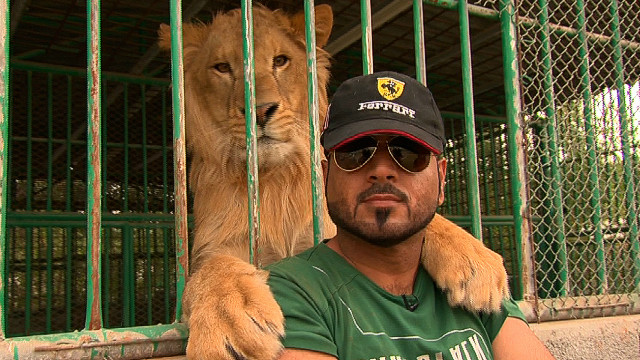
Ali manages the Ras Al Khaimah
Wildlife Park, set up a few years ago under the patronage of Sheikh Taleb bin
Saqr Al Qasimi, one of the Ras Al Khaimah's royals. He has been adopting
neglected and mistreated animals for more than 15 years.
Many of those animals, including
Teymour, are endangered or exotic, and were initially bought on the black
market.
Owning an endangered animal as a
pet is illegal in the United Arab Emirates, a signatory of the Convention on the
Illegal Trade of Endangered Species (CITES). However, the trade in endangered
wildlife remains a problem in the Gulf, where owning expensive exotic pets,
especially big cats, is the ultimate status symbol. A rare white lion sells for
around $50,000 on the black market, Abu Dhabi Wildlife Center.
None of the pet owners we
approached would speak on the record about illegally purchasing exotic animals,
but many amateur videos uploaded online attest to their popularity among young
men in the Gulf.
In one YouTube clip that was
widely viewed in the region, a man frightens his friend by chasing him around
the living room with a chained lioness. Another clip shows a group of men
walking a cheetah on a leash in an indoor location. There's even a man trying to
ride a fully grown lion.
It is all about bragging rights
for the men buying these animals, says Ali.
"If someone buys a very
expensive animal, he is boasting that he has enough money to get anything he
wants," he said. "If he has a tamed wild animal like a lion, he is trying to
show off that he is brave. But this is not courage; this is animal rights
abuse."
It has largely fallen on private
individuals like Ali, backed by the government, to care for neglected illegally
obtained animals.
If someone buys a very expensive animal, he is boasting that he has enough
money to get anything he wants
Jasim Ali, Ras Al Khaimah Wildlife Park
Jasim Ali, Ras Al Khaimah Wildlife Park
More than 200 illegal animals in
the United Arab Emirates were confiscated alive by the authorities in 2010,
according to CITES. Most big cats are sent to the Abu Dhabi Wildlife Center,
which is privately funded by Sheikh Mansour bin Zayed Al Nahayan, a member of
Abu Dhabi's ruling family.
The large cages harbor a
staggering variety of rare animals -- white lions, white tigers, black jaguars,
cheetahs, baboons and wolves -- to name a few.
Ayesha Kelaif shoulders the
burden of smaller animals.
The the petite mother of four
cares for almost 300 animals as varied as iguanas, alpacas, foxes, monkeys and
pheasants in her residential villa that doubles up as the Dubai Animal Rescue
Center. All the animals were abandoned or rescued and some are exotic and
endangered.
Her closest friend, an
endangered South American macaw named Rio, was abandoned in a cardboard box in a
parking lot. Rio sits perched on her shoulder throughout the interview, pecking
at the microphone.
Relying on help from volunteers,
Kelaif spends most of her income taking care of the animals. The recently
widowed government employee spends a hefty $10,000 per month to cover everything
from veterinary costs to electricity for 19 air-conditioning units for the
animal cages.
The passion and the love that you get from them is amazing
Ayesha Kelaif, Dubai Animal Rescue Center
Ayesha Kelaif, Dubai Animal Rescue Center
"We don't save anything. I don't
have any retirement fund; it's all for the animals," said Kelaif. She added that
she carries financial burden because the reward is priceless. "The passion and
the love that you get from (the animals) is amazing and if there's anything I
can do to help animals you can't put a price on it."
Recently granted land by the
Dubai government, Kelaif cannot afford to build the infrastructure for the
rescue center that she hopes will one day be her legacy.
Her passion for animals goes
back to her childhood. Both her parents died of cancer when she was nine and her
siblings were split up. Kelaif says animals helped her cope.
"I got so much love from these
guys, they used to make me so happy, I used to just go sit in the alleyways and
just feed a dog or touch a cat and I used to be so happy," she said.
Kelaif said people buy exotic
animals without understanding the unique needs they have and the level of
responsibility involved. People who buy baby lion and tiger cubs can no longer
take care of them when they get larger and start showing violent tendencies.
It's not just locals -- many expatriate families leave their pets behind when
the leave the country.
Both Kelaif and Ali realize they
are in a legal gray area when it comes to the exotic animals they shelter. Any
endangered animal needs appropriate paperwork from CITES. Animals that have been
smuggled into the country, even if rescued, technically remain illegal by
international standards despite having permissions from local authorities.
But these animal lovers say
paperwork will not stop them from doing the right thing.
Ali said he has reached out to
animal rights groups and wants their help setting up a wildlife reserve in Ras
Al Khaimah, since the animals' legal limbo makes repatriation difficult. He says
he is surprised that recent media attention, instead of bringing him assistance,
has brought him criticism from some.
"My wish is that, instead of
criticizing me, these people would offer me help. I haven't done anything wrong;
I've protected these animals and created a sanctuary for them. I'm trying to get
them to appropriate wildlife reserves."/cnn.com/


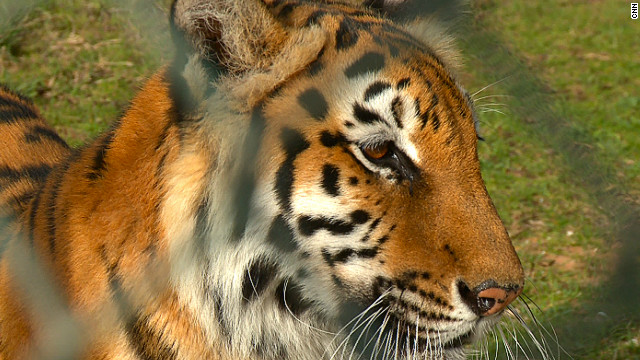 A Siberian tiger at Abu Dhabi Wildlife Center. Ninety
percent of the center's animals are rescued.
A Siberian tiger at Abu Dhabi Wildlife Center. Ninety
percent of the center's animals are rescued.
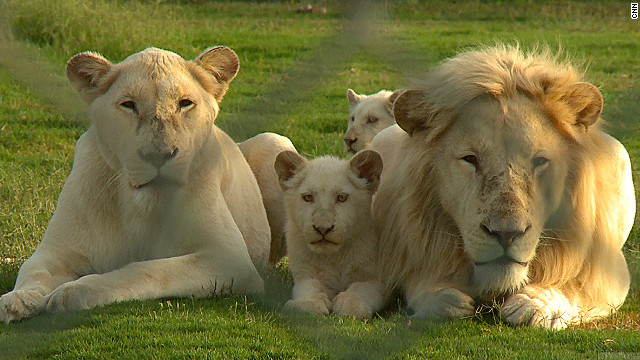 A family of white lions at the Abu Dhabi Wildlife Center,
where most confiscated big cats are brought. White lions can go for $50,000 on
the black market, according the to center.
A family of white lions at the Abu Dhabi Wildlife Center,
where most confiscated big cats are brought. White lions can go for $50,000 on
the black market, according the to center.
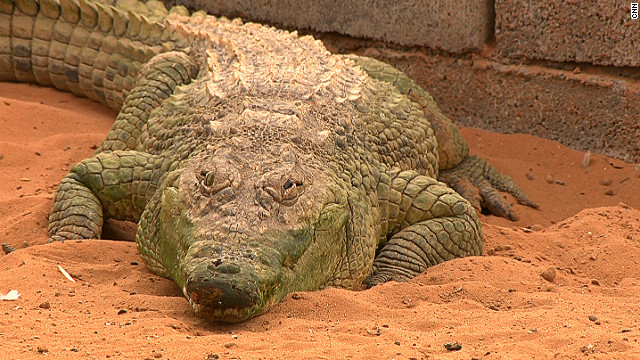 An endangered Nile crocodile in Ras Al Khaimah Wildlife
Park. A baby crocodile can be bought illegally in animals markets for as little
as $150, according to Ali.
An endangered Nile crocodile in Ras Al Khaimah Wildlife
Park. A baby crocodile can be bought illegally in animals markets for as little
as $150, according to Ali.
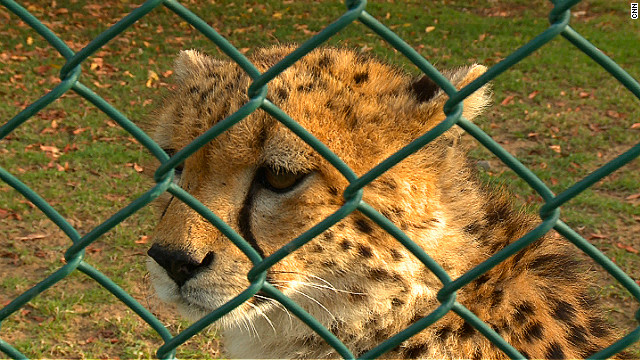 Cheetahs, the fastest animals on land, are popular status
symbol pets. One YouTube video shows a cheetah being lead around on a leash
indoors.
Cheetahs, the fastest animals on land, are popular status
symbol pets. One YouTube video shows a cheetah being lead around on a leash
indoors.
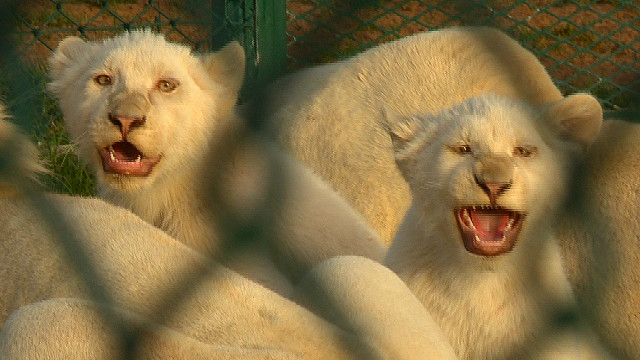 White lion cubs at the Abu Dhabi Wildlife Center. Some big
cats bought as cubs are abandoned when they grow bigger and more violent.
White lion cubs at the Abu Dhabi Wildlife Center. Some big
cats bought as cubs are abandoned when they grow bigger and more violent.
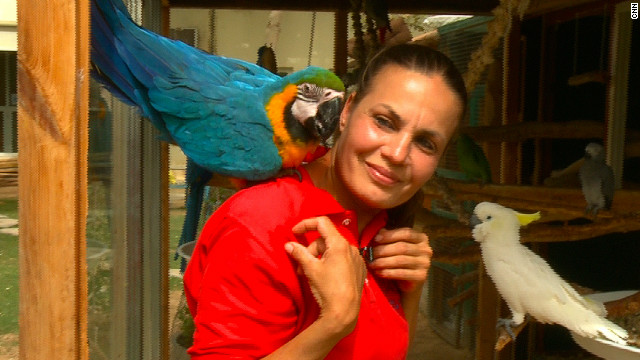 Ayesha Kelaif with her South American macaw Rio, an
endangered animal. She found him abandoned in a cardboard box in a parking
lot.
Ayesha Kelaif with her South American macaw Rio, an
endangered animal. She found him abandoned in a cardboard box in a parking
lot.
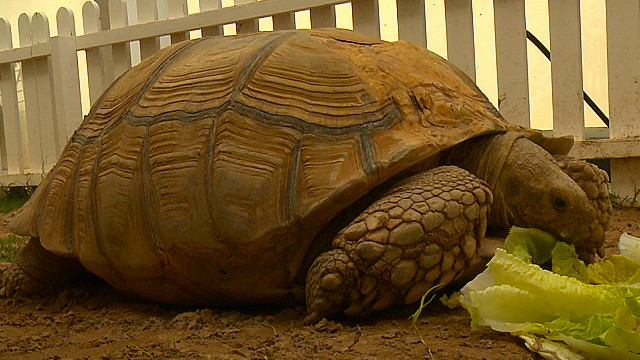 A 75-year-old tortoise at Dubai Animal Rescue Center.
Founder Ayesha Kelaif says these tortoises live to 150, so she says you have to
plan ahead when you buy an animal.
A 75-year-old tortoise at Dubai Animal Rescue Center.
Founder Ayesha Kelaif says these tortoises live to 150, so she says you have to
plan ahead when you buy an animal.
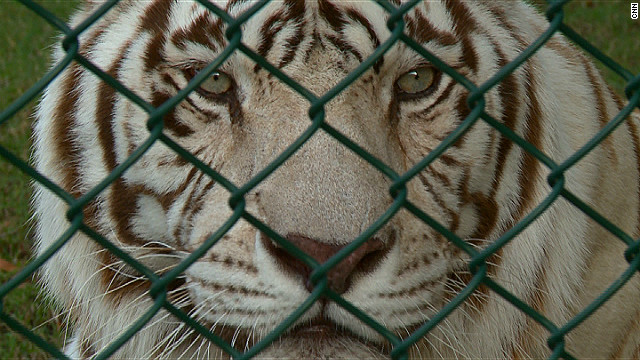 A rescued white tiger at the Abu Dhabi Wildlife
Center.
A rescued white tiger at the Abu Dhabi Wildlife
Center.
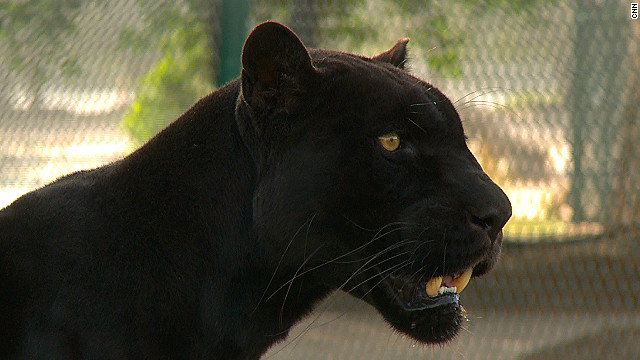 A black jaguar at Abu Dhabi Wildlife Center, where most
confiscated pets are looked after.
A black jaguar at Abu Dhabi Wildlife Center, where most
confiscated pets are looked after.










Post a Comment